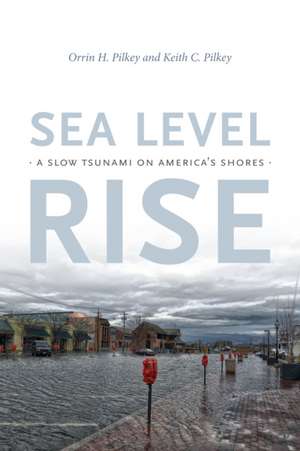Sea Level Rise – A Slow Tsunami on America`s Shores
Autor Orrin H. Pilkey, Keith C. Pilkeyen Limba Engleză Paperback – 19 sep 2019
Keith C. Pilkey is an administrative law judge with the Social Security Administration. He is coauthor, with Orrin H. Pilkey, of Global Climate Change: A Primer, also published by Duke University Press.
Preț: 215.32 lei
Nou
Puncte Express: 323
Preț estimativ în valută:
41.21€ • 42.97$ • 34.25£
41.21€ • 42.97$ • 34.25£
Carte indisponibilă temporar
Doresc să fiu notificat când acest titlu va fi disponibil:
Se trimite...
Preluare comenzi: 021 569.72.76
Specificații
ISBN-13: 9781478006374
ISBN-10: 1478006374
Pagini: 208
Ilustrații: 34 color illustrations, 1 map; 34 color illustrations, 1 map
Dimensiuni: 153 x 232 x 12 mm
Greutate: 0.39 kg
Editura: MD – Duke University Press
ISBN-10: 1478006374
Pagini: 208
Ilustrații: 34 color illustrations, 1 map; 34 color illustrations, 1 map
Dimensiuni: 153 x 232 x 12 mm
Greutate: 0.39 kg
Editura: MD – Duke University Press
Cuprins
Acknowledgments
Prologue
1. Flee the Sea: Climate Refugees
2. The End of the Inupiat Way of Life
3. Lord Willing and the Creek Don't Rise: Sunny Day Flooding
4. Dirty Waters and Worried Minds: Health Concerns in an Age of Climate Change
5. The Front Line in the Battle: The U.S. Military
6. At-Risk Coastal Environments: Is Resilience Futile?
7. The Environmental Impact of Surging Seas: Life at the Edge
8. Inundated Infrastructure: Imperiled Energy Facilities
9. Coast Catastrophes: Cities on the Brink
10. Under Water: National Flood Insurance and Climate Gentrification
11. What You Can Do about Sea Level Rise
Appendix A. Global Delta Population Displacement Potential by 2050
Appendix B. The Economic and Environmental Price of Holding the Shoreline Still with Hart Stablization
Appendix C. Living with the Shore Book Series
References
Index
Prologue
1. Flee the Sea: Climate Refugees
2. The End of the Inupiat Way of Life
3. Lord Willing and the Creek Don't Rise: Sunny Day Flooding
4. Dirty Waters and Worried Minds: Health Concerns in an Age of Climate Change
5. The Front Line in the Battle: The U.S. Military
6. At-Risk Coastal Environments: Is Resilience Futile?
7. The Environmental Impact of Surging Seas: Life at the Edge
8. Inundated Infrastructure: Imperiled Energy Facilities
9. Coast Catastrophes: Cities on the Brink
10. Under Water: National Flood Insurance and Climate Gentrification
11. What You Can Do about Sea Level Rise
Appendix A. Global Delta Population Displacement Potential by 2050
Appendix B. The Economic and Environmental Price of Holding the Shoreline Still with Hart Stablization
Appendix C. Living with the Shore Book Series
References
Index
Notă biografică
Descriere
Acknowledging the impending worldwide catastrophe of rising seas in the twenty-first century, Orrin H. Pilkey and Keith C. Pilkey outline the impacts on the United States' shoreline and argue that the only feasible response along much of the U.S. shoreline is an immediate and managed retreat.
